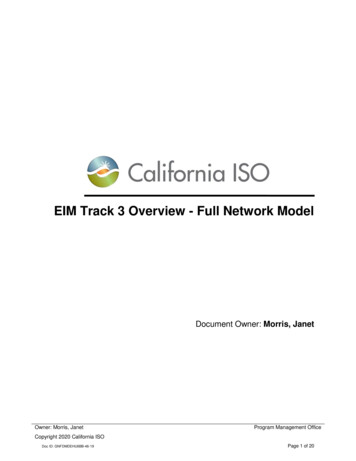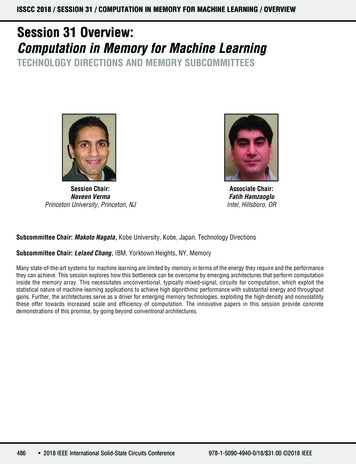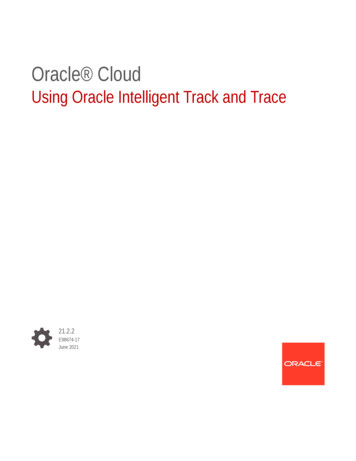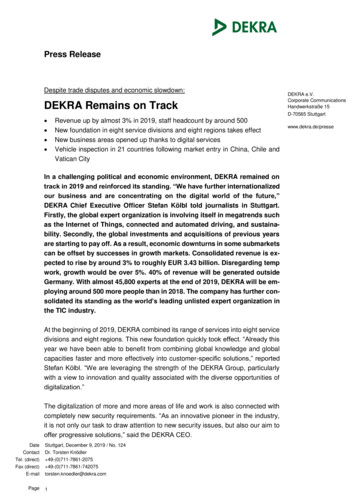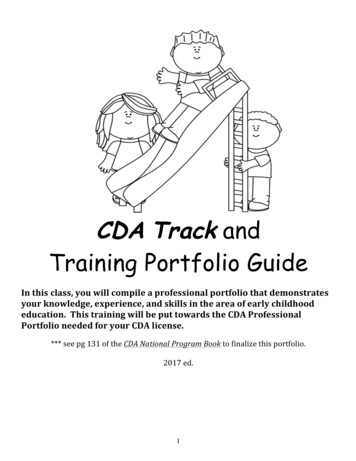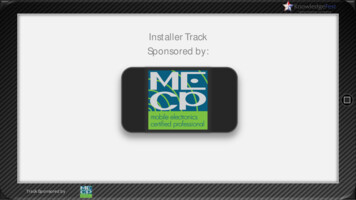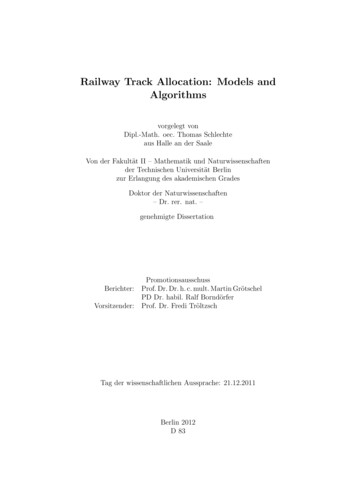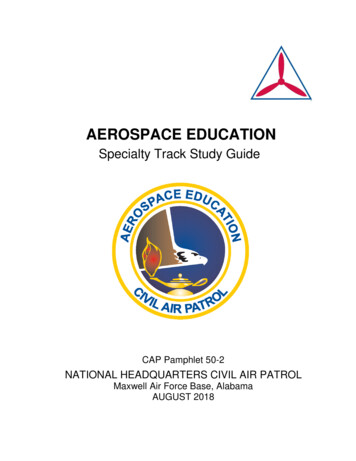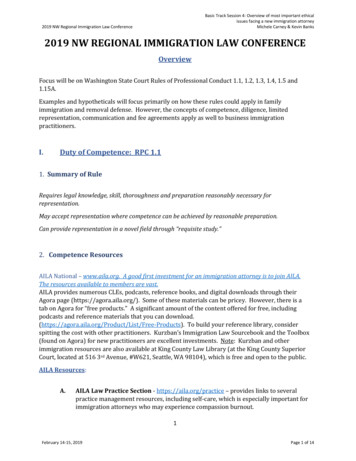
Transcription
Basic Track Session 4: Overview of most important ethicalissues facing a new immigration attorneyMichele Carney & Kevin Banks2019 NW Regional Immigration Law Conference2019 NW REGIONAL IMMIGRATION LAW CONFERENCEOverviewFocus will be on Washington State Court Rules of Professional Conduct 1.1, 1.2, 1.3, 1.4, 1.5 and1.15A.Examples and hypotheticals will focus primarily on how these rules could apply in familyimmigration and removal defense. However, the concepts of competence, diligence, limitedrepresentation, communication and fee agreements apply as well to business immigrationpractitioners.I.Duty of Competence: RPC 1.11. Summary of RuleRequires legal knowledge, skill, thoroughness and preparation reasonably necessary forrepresentation.May accept representation where competence can be achieved by reasonable preparation.Can provide representation in a novel field through “requisite study.”2. Competence ResourcesAILA National – www.aila.org. A good first investment for an immigration attorney is to join AILA.The resources available to members are vast.AILA provides numerous CLEs, podcasts, reference books, and digital downloads through theirAgora page (https://agora.aila.org/). Some of these materials can be pricey. However, there is atab on Agora for “free products.” A significant amount of the content offered for free, includingpodcasts and reference materials that you can -Products). To build your reference library, considerspitting the cost with other practitioners. Kurzban’s Immigration Law Sourcebook and the Toolbox(found on Agora) for new practitioners are excellent investments. Note: Kurzban and otherimmigration resources are also available at King County Law Library (at the King County SuperiorCourt, located at 516 3rd Avenue, #W621, Seattle, WA 98104), which is free and open to the public.AILA Resources:A.AILA Law Practice Section - https://aila.org/practice – provides links to severalpractice management resources, including self-care, which is especially important forimmigration attorneys who may experience compassion burnout.1February 14-15, 2019Page 1 of 14
Basic Track Session 4: Overview of most important ethicalissues facing a new immigration attorneyMichele Carney & Kevin Banks2019 NW Regional Immigration Law ConferenceB.AILA Ethics – www.aila.org/practice/ethics. Provides links to several ethicsresources, including the Ethics Compendium for deep analysis of the RPCs.2February 14-15, 2019Page 2 of 14
Basic Track Session 4: Overview of most important ethicalissues facing a new immigration attorneyMichele Carney & Kevin Banks2019 NW Regional Immigration Law ConferenceC.Practice management advice and ethics consultations (AILA staff CharityAnastasio and Reed Tautz) www.aila.org/practice/assistance-program – if you have athorny or sensitive ethics issue that you would like to discuss confidentially.D.AILA Infonet - www.aila.org/infonet - tremendous resources for research.3February 14-15, 2019Page 3 of 14
Basic Track Session 4: Overview of most important ethicalissues facing a new immigration attorneyMichele Carney & Kevin Banks2019 NW Regional Immigration Law ConferenceE.CLE opportunities – www.aila.org/conferences. Includes the AILA AnnualConference, International and Regional CLEs, Audio and Web seminars and recordingsfrom past conferences.4February 14-15, 2019Page 4 of 14
Basic Track Session 4: Overview of most important ethicalissues facing a new immigration attorneyMichele Carney & Kevin Banks2019 NW Regional Immigration Law ConferenceF.AILA New Member Resources – www.aila.org/membership/nmd. You can findresources here for mentors, practice management, ethics resources and a newmember listserv. A great first resource page.5February 14-15, 2019Page 5 of 14
Basic Track Session 4: Overview of most important ethicalissues facing a new immigration attorneyMichele Carney & Kevin Banks2019 NW Regional Immigration Law ConferenceG.AILA, Washington State Chapter. www.ailawa.orgWhen you join AILA, you need to choose a chapter to belong to. You can choosemultiple chapters and pay the dues for each. With your membership, you get addedto the local listserv, and can join committees and other smaller listservs, such as thenew members committee, parents committee. You can log on the AILAWA websitefor further information.2019 AILA-WA new member information: Contact Luz Metz atLuz@metzlawgroup.com H.Mentor program.Monthly brown bags.OtherWSBA Ethics line (for ethics advice): 6February 14-15, 2019Page 6 of 14
Basic Track Session 4: Overview of most important ethicalissues facing a new immigration attorneyMichele Carney & Kevin Banks2019 NW Regional Immigration Law ConferenceWSBA CLEs on ethics and immigration issues – www.wsba.org/for-legalprofessionals/ethicsWSBA Wellness programs - -support/wellnessWSBA Solo and Small Practice Section - and-small-practice-section. Good practice managementtips, seminars, annual conference.Other organizational websites with educational materials, CLEs: Immigrant &Refugee Appellate Center- www.irac.net (appellate resources, includinginformation on Board of Immigration Appeals);http://www.asistahelp.org/en/about asista/ (U Visas, VAWA).ABA Center for Professional Responsibility https://www.americanbar.org/groups/professional responsibility/ - there arepractice management tips and immigration resources as well.3.Competence TipsA.Go to the primary source and read through the regulations, statute or cases yourselffirst. If you cannot understand the statute, seek secondary resources offeredthrough reference books (such as Kurzbans or AILA resources above) that willanalyze the primary sources.B.Ask questions of colleagues, mentors, or on listservs even if they appear basic or“easy” (they often are not). Even experienced practitioners ask the “easy” questions.C.Take pro bono cases from NWIRP, KIND or other organizations where you will bedoing real work but also receive supervision. This is also a deeply rewardingpersonal experience as the cases usually have good facts and often the clients arevery grateful. It also gives you real life experience in court or filing affirmativeapplications.D.Co-counsel with a more experienced lawyer or refer a case out if you feel it iscompletely out of your comfort zone.E.Don’t “dabble” in immigration law. It is all interrelated (and getting more so) so youhave to make a commitment to get to know a large part of it to handle matterscompetently. Failure to do so can lead to severe consequences for clients, and oftenleads to bar complaints.F.Find an area within immigration law that you are interested in and learn that areawell. Then if you want to branch out to other areas, you will be more proficient todo so.7February 14-15, 2019Page 7 of 14
Basic Track Session 4: Overview of most important ethicalissues facing a new immigration attorneyMichele Carney & Kevin Banks2019 NW Regional Immigration Law ConferenceII.Duty of Diligence (RPC 1.3) and Rule Allowing Limited Representation(RPC 1.2)1.Summary of RulesA lawyer must act with “reasonable” diligence and promptness in representing client. Overlaps withduties of competence (1.1) and communication (1.4).A lawyer may limit the scope of the representation if the limitation is reasonable and the client givesinformed consent to the limited scope of the representation.Though the diligence rule seems to be obvious, disciplinary cases against immigration lawyersoften involve violations of this basic duty. Violations arise from missing important deadlines,missing court dates, filing bare bones pleadings or briefs that don’t include facts and/or a legalbasis for the relief sought, failing to provide the agency with required documentation, taking “shortcuts” that undermine the client, etc.2.Diligence Tips and ResourcesA.If you have a medium-high volume practice, immigration specific case managementsystems are enormously helpful and quite affordable. Talk to other practitionersand/or consult with AILA practice management advisor Charity Anastasio.B.Have multiple calendars and alerts to remember deadlines. Outlook calendarsthrough Office 365 have email reminder functions that can act as a tickler. Manymalpractice carriers suggest that you have at least two calendar systems with twodifferent staff members monitoring the calendars.C.Make sure your client updates you with their contact info. If you can’t reach them,document it in writing by sending emails, letters etc. If you can’t reach your clientafter making best efforts and documenting those efforts, you should attempt towithdraw. Make sure the client understands the importance of this, as they alsoneed to update either DHS or EOIR with address changes to stay compliant with theregulations.D.Keep track of your cases. Some can be pending for years which can lead to errors.One option to avoid this problem is limiting your representation, which is permittedunder RPC 1.2(c) if the client understands the limitation and gives informedconsent.Examples: If you are hired to file an I-130 for a sibling, the estimated processingtime for adjudication of the I-130 within the USCIS (as of the date of this CLE) isapproximately 90-117 months and the USCIS is currently adjudicating I-130petitions (F4 sibling category) filed as of June 19, 2009 – which is almost 10 years.In the past, many practitioners would accept a legal fee to file the I-130 and monitorit until the approval or final decision on the case. However, the processing time now8February 14-15, 2019Page 8 of 14
Basic Track Session 4: Overview of most important ethicalissues facing a new immigration attorneyMichele Carney & Kevin Banks2019 NW Regional Immigration Law Conferenceis so long and can even increase to more than 10 years. It can be risky to have to beresponsible for monitoring that case for that many years and making sure that youare doing regular status checks on the case, keeping the client informed andupdating the government with a client or firm address change.Another example would be the filing of a U visa once you have a certification. Uvisas are now backlogged for several years and again, it is risky to have an open filefor many years. You must have the proper staff and resources to keep the caseactive in your office and monitored. In addition, the initial legal fee you took maynot cover the multiple year delay, which means if you took a flat fee, then you will bedoing essentially pro bono work for several years on a case.Possible Limited Representation Solution: You may want to consider limiting thescope of your agreement to take the legal fees and complete the portion of the casethat you can do now and then provide the client with detailed instructions on howto keep their address current with the USCIS (by the filing of an AR-11 form),checking case status online, receiving email notifications from USCIS and re-hiringthe firm or another lawyer if there is a request for evidence.E.If you are overwhelmed or can’t cope with your case load, do something to addressit. Maybe you need to hire an associate, paralegal (contract lawyers or paralegalsare an option if you don’t want to commit) or an office assistant. Though it can costmoney, it’s worth it if it saves you from discipline. Maybe you need counseling tohandle a personal matter that is affecting your work. Or you are suffering fromcompassion fatigue and need a vacation. Take care of yourself. Resources can befound at: t/wellness.111. Duty of Communication – RPC 1.41.Summary of RuleLawyer must “reasonably” consult with client about means by which representation will beaccomplished, keep client reasonably informed about status, promptly respond to requests for info,and explain matter to the extent reasonably necessary to permit client to make informed decisionsabout the case.Emphasis of the rule is not only on keeping client regularly informed about status (quantity ofcommunication) but also that the lawyer gives the client the information necessary to make his/herown informed decisions about how to accomplish client’s objectives (quality of communication).2.Communication TipsA.Make sure communications are clear and understood by the client. Though it mightnot be possible to have a written record of everything, the more that is in writingthe better. Keep records of all client contacts in writing. It helps protect you later if9February 14-15, 2019Page 9 of 14
Basic Track Session 4: Overview of most important ethicalissues facing a new immigration attorneyMichele Carney & Kevin Banks2019 NW Regional Immigration Law Conferencethe client files a bar complaint or threatens a malpractice suit. Recollections fade.Written evidence lives on.B.Use email or letters rather than texting. Texts are too cryptic and depending onyour phone settings, hard to retrieve if needed months later.C.If you have staff, make sure your staff all follow your communication procedureswith clients. It is helpful to have weekly meetings with staff to discuss client cases,deadlines and communication. If you find that an employee is not documentingcommunication with a client in accordance with your office procedures, you need tocontinue to talk to that employee until they are able to follow your instructions.D.If a client chooses not to take your advice on an issue, write to the client as to thecourse of action you are recommending, and note that the client has decided not tofollow it despite possible risks to their case. (Note that you must withdraw if youobtain knowledge the client is using your services in furtherance of a fraud. Youmay also be required to inform the court if you discover that your client has engagedin fraud or provided false evidence).E.If you make a major mistake during the representation, you are required to tell theclient. Many mistakes can be fixed and it is your duty to try fix them, or recommendthe client seek other counsel. Do not hope the mistake will not be noticed or put offaddressing it. Unfortunately, many lawyers do just that and find themselves facing adisciplinary complaint. Do not ask the client to “waive” filing a bar complaint ormalpractice claim as a condition of fixing a mistake.Example: You file an I-130 application on behalf of a USC parent for their minorchild and forget to include the birth certificate of the client’s child. To correct youhave several options. The first thing you should do is inform the client about themistake, the solution and all the possible outcomes. If there are any additional costsinvolved, you have to eat all the costs. In the example above, you could try and senda supplemental letter to the USCIS, with a copy of the receipt notice and birthcertificate and let USCIS know that the birth certificate was inadvertently left out.Unfortunately, because it is the government, your letter may or may not reach thefile. Hopefully, the USCIS would issue a Request for Evidence (RFE), where you cansimply respond with the birth certificate. If the application is denied, then it will beyour responsibility to properly re-file the application with no additional legal feeand pay the government filing fee.Another example would be if you missed a filing deadline for a case, such as adeadline for an application for cancellation of removal in a removal case. TheImmigration Judge then orders your client removed due to the missed deadline. Atthat point, you should admit your mistake, refund the client the entire legal fee andtell him to go seek the services of another attorney to file a motion to reopen forineffective assistance of counsel. This could require the filing of a bar complaint bythe client and lead to possible discipline, but you have made a mistake and need toput the client back into a situation that protects them from removal.10February 14-15, 2019Page 10 of 14
Basic Track Session 4: Overview of most important ethicalissues facing a new immigration attorneyMichele Carney & Kevin Banks2019 NW Regional Immigration Law Conference111. Duties to Relating to Fees – RPC 1.51.Summary of RuleAll fees and costs, whether flat or hourly, must be reasonable. Several factors are considered, includingtime and labor required, fee customarily charged in the area, work involved and results obtained, timelimitations imposed by client or circumstances, experience of the lawyer, fair disclosure to client, etc.Note: RPC 1.5 does not require that hourly fee agreements be in writing although we stronglyrecommend putting them in writing. It does require that flat fee agreements be in writing andinclude the specific language in RPC 1.5(f)(2).Most immigration fee agreements are flat fee. Our discussion will be limited to flat fee and “hybrid”fee agreements, i.e, combination of flat and hourly.2.Tips for flat fee agreementsA.Basic information that must or should be included:(1) Name of Client(2) Language that client has agreed to pay a flat fee for certain services, amount offee and terms of payment, that fee will be deposited in lawyer’s general account andnot a trust account, that the agreement does not alter the client’s right to terminateand that the client may be entitled to a refund if the agreed upon services have notbeen completed. NOTE: This is the RPC 1.5(f)(2) language and is mandatory. Alsonote that language that the entire flat fee is “non-refundable” is not permitted.(3) Language explaining the scope of representation. Include here what is NOTincluded, i.e., a response to a USCIS request for additional evidence, an appeal of anIJ decision, etc.(4) Language specifying what costs and expenses will be included in the flat fee andwhat costs and expenses will not (for instance you may decide it’s not worth thebother of charging for photocopying charges under a certain amount of pages).Costs/Expenses usually not included: visa and petition application fees, attorney orsupport staff travel, records requests, investigator fees, notary fees, etc.(5) Language that results cannot be guaranteed.(6) Language that client agrees that all communications with the government will bethe responsibility of the attorney unless attorney and client agree otherwise.(7) Language about client responsibilities including, but not limited to: keepingattorney informed of change in contact information, being completely truthful withattorney (and warning that attorney may need to withdraw if client is not truthful),keeping up with payment plan (if applicable), etc.11February 14-15, 2019Page 11 of 14
Basic Track Session 4: Overview of most important ethicalissues facing a new immigration attorneyMichele Carney & Kevin Banks2019 NW Regional Immigration Law Conference(8) Language regarding client’s right to terminate representation and what willoccur if that happens after lawyer has already performed work. Lawyer may have aright to quantum meruit recovery for work already performed. However, attorneymust keep time records to prove quantum meruit.(9) Language regarding what happens to the client file at termination ofrepresentation.(10) Signature line for both client and attorney.B.Optional paragraphs:(11) Language obtaining client consent to use of certain communication tools (suchas email) and to use of the cloud for storage of client information.(12) If someone other than the client is paying, explanation that lawyer will notprovide information relating to the representation to the payor without client’sconsent.(13) If representing husband and wife, multiple family members, or employer andemployee, waiver of possible conflicts of interest.C.Hybrid fee agreements:Permissible if entire fee is reasonable. Scope of work covered by the flat fee portionand the hourly fee portion must be very clearly explained. For instance, there canbe a flat fee to file the client’s application and an hourly fee for
time for adjudication of the I-130 within the USCIS (as of the date of this CLE) is approximately 90-117 months and the USCIS is currently adjudicating I-130 petitions (F4 sibling catego
